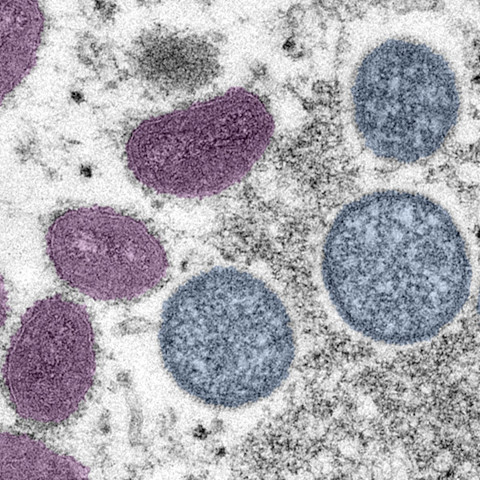Mpox Home

Mpox (monkeypox) s a viral infection, with symptoms that can include a painful and uncomfortable rash or sores, often accompanied with flu-like illness. Mpox can result in severe disease requiring hospitalization particularly in persons with other health conditions or those who are immunocompromised
Anyone, regardless of sexual orientation or gender identity, can get mpox through close, personal contact with someone who has symptoms of mpox. However, data suggests that the virus has primarily spread among social networks of gay, bisexual, and same gender-loving men through intimate contact. Risk is especially high for same gender-loving men who have multiple or anonymous sexual partners.
Reported case numbers of the 2022-2024 Clade II mpox outbreak can be found on the CDPH Mpox Data Dashboard.
No cases of the 2023-2024 Clade I mpox strain that has been seen in other parts of the world have been reported in Chicago. CDPH is working closely with the CDC to respond as needed.
Questions about Mpox?
Contact the HIV/STI Resource Hub (LGBTQ+ call center) at 844-482-4040
or the CDPH Call Center at 312-746-4835.
- Mpox (monkeypox) is spread through close contact with body fluids, sores, shared bedding or clothing, or respiratory droplets (kissing, coughing, sneezing).
- The JYNNEOS™ vaccine can help protect people against mpox and is recommended for sexually active bisexual, gay, and other same-gender loving men, transgender persons, AND anyone who has had close contact with someone diagnosed with mpox regardless of sex, gender, or sexual orientation.
- Common symptoms: Rash or unusual sores that look like pimples or blisters on the face, body, and genitals, fever, chills, head or muscle aches, or swelling of lymph nodes.
- Clinicians: Please refer to our Chicago Health Alert Network for additional information including specimen collection and infection prevention guidance.
Mpox (monkeypox) spreads from person to person in different ways. The main way it is currently spreading is through direct contact with a rash or sore on someone infected with mpox. It can also spread through clothing, bedding/linens, or other materials used by a person infected with mpox, or through respiratory secretions during prolonged, face-to-face contact.
Spread can occur during intimate activities, including:
- Oral, anal, and vaginal sex.
- Hugging, kissing, and cuddling.
- Contact with bedding or other items that have the virus on them during or after intimate activity.
We currently believe that mpox spreads from the time symptoms start until the rash has fully healed and a fresh layer of skin has formed. This typically takes about 2-4 weeks. At this time, it is not known if mpox can spread through saliva, semen, or vaginal fluids.
- Review how mpox spreads and whether you have had close contact with someone who has been diagnosed with mpox.
- Practice good prevention.
- Continue routine daily activities (e.g. school, work) as long as you do not have symptoms but avoid close, personal, skin-to-skin contact
- Avoid sex and other close personal contact
- Avoid large gatherings, especially if they involve close, personal, skin-to-skin contact
- Do not share personal items like towels, bedding, dishes, utensils, or eating utensils
- Get vaccinated. The mpox vaccine is recommended for anyone, regardless of sexual orientation or gender identity, who has been in close, personal contact with someone who has been diagnosed with mpox. Vaccinations can reduce the risk of infection and serious illness for those who have been exposed but are not exhibiting symptoms. Make sure to get the second recommended does 28 days later.
- Watch for signs and symptoms for 21 days from the date of your last exposure.
- Take your temperature with a thermometer twice a day (morning and night)
- Check for rash or unusual sores that look like pimples or blisters on the face, body, and genitals
- Call your healthcare provider or a health center if you show symptoms or need to be evaluated or tested. There is no at-home test for mpox. The test can only be given to those exhibiting rash symptoms. If you don’t have a doctor or insurance, contact HIV/STI Resource Hub at 844.482.4040 / hivhub.org or visit FindAHealthCenter.hrsa.gov for free or low-cost care.
- Isolate if you or your partner(s) feel sick or have a new or unexplained rash or sores.
- Isolate in a private room and avoid close contact with other people and animals in your household
- Take a break from sex and other close personal contact
- Do not share personal items like towels, bedding, dishes, utensils, or eating utensils
- Use a face mask and cover rash and sores when you are unable to separate from others
- Call your health care provider or a health center right away if you or your partner(s) show signs and symptoms of mpox. If you don’t have a doctor or insurance, contact HIV/STI Resource Hub at 844.482.4040 / hivhub.org or visit FindAHealthCenter.hrsa.gov for free or low-cost care.
- Get tested through your healthcare provider. There is no at-home test for mpox. The test can only be given to those exhibiting rash symptoms.
- Let close contacts know they may have been exposed to mpox. Communication is the key to controlling this outbreak.
- Take care of yourself and follow recommended treatments. Most people with mpox recover fully within 2 to 4 weeks without the need for medical treatment.




